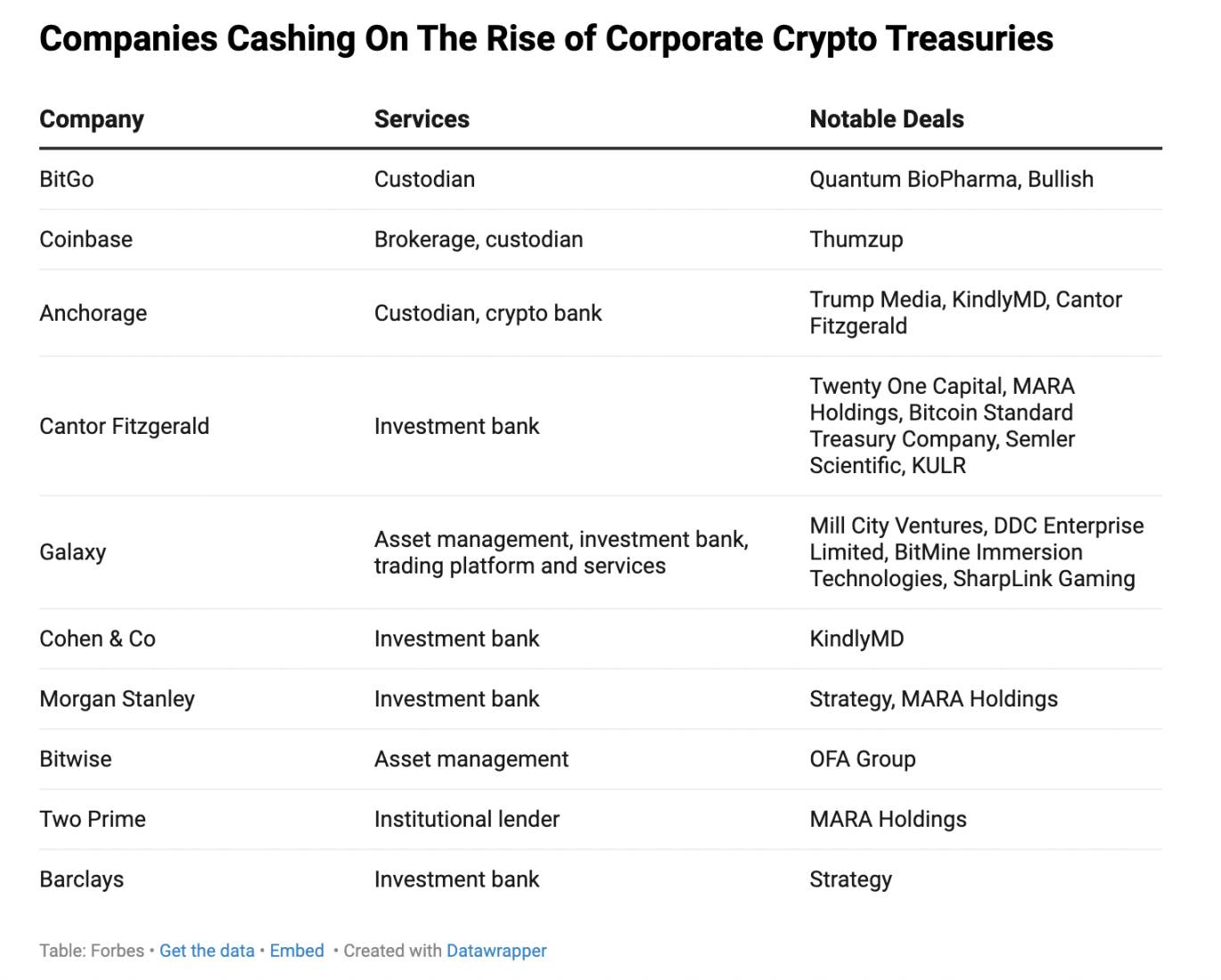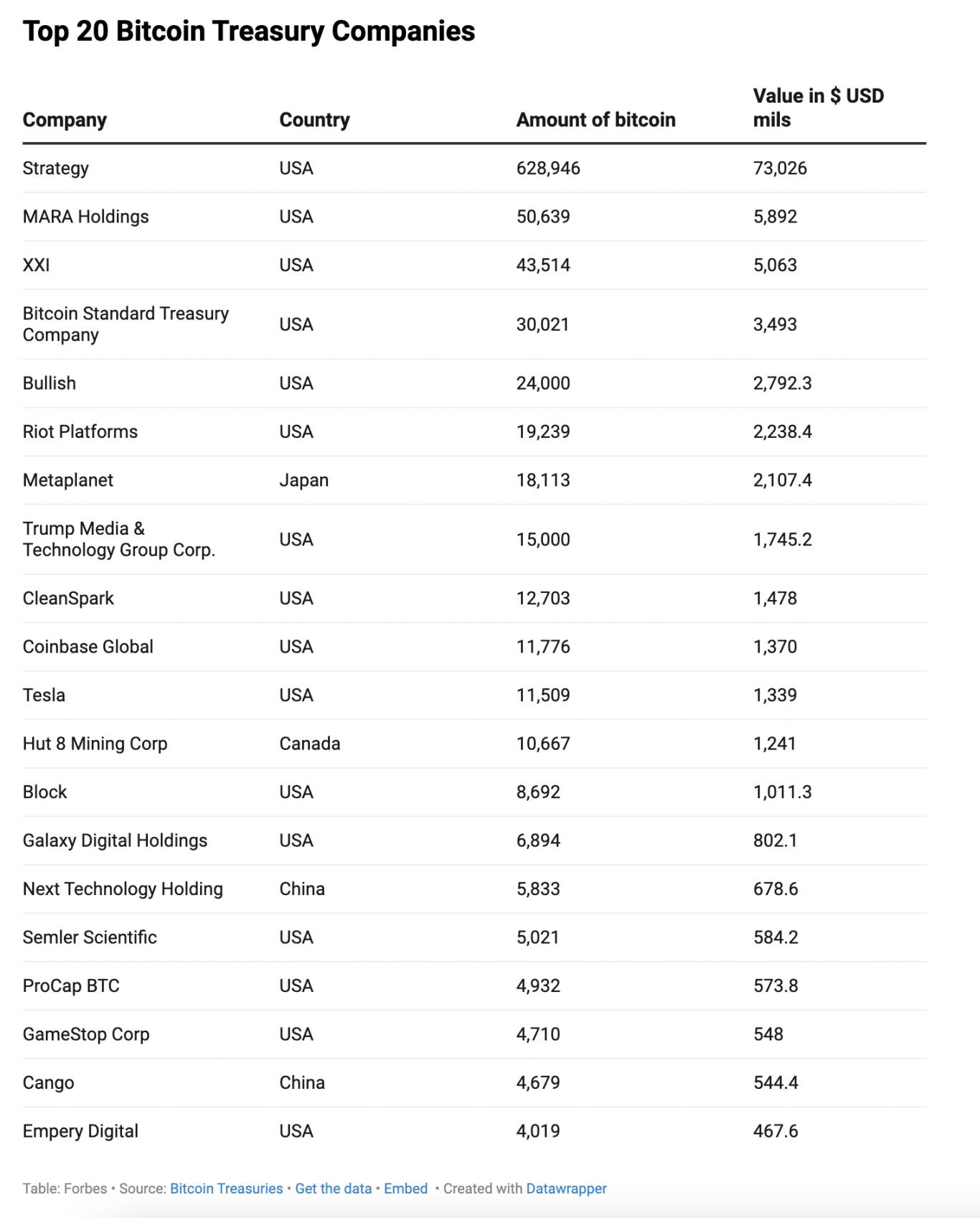The real wealth feast is flowing towards the "tool providers" in this latest "gold rush."
Written by: Julie Goldenberg, Forbes
Translated by: Luffy, Foresight News
Today, the number of publicly traded companies incorporating cryptocurrency into their balance sheets has reached a record high. On the surface, they claim to diversify their portfolios, hedge against inflation, and attract new investors; of course, the unspoken reason is that management hopes to boost stock prices. In recent months, merely announcing a so-called "cryptocurrency treasury" strategy has been enough to give companies a premium on their stock prices.
However, the real wealth feast is flowing towards the "tool providers" in this latest "gold rush": custodians, brokers, asset management firms, and investment banks that charge fees for every transaction, transfer, and storage operation.
Nathan McCauley, co-founder and CEO of Anchorage Digital based in San Francisco, stated that this trend has "reached a frenzy" in the past six months and has "created a contagion effect." This crypto bank has secured multiple deals, including the custody of a $2 billion Bitcoin treasury for Trump Media Group and the custody of $760 million in assets for Nakamoto Holdings. Nakamoto Holdings is a Bitcoin-focused company that recently announced a merger with KindlyMD through a special purpose acquisition company (SPAC). KindlyMD is a small medical company in Salt Lake City that has been operating at a loss, with its stock price long below $2 before the merger announcement in May; now, Nakamoto Holdings, named after Bitcoin's anonymous founder Satoshi Nakamoto, is listed on NASDAQ (stock code: NAKA) with a stock price of $15 and a market capitalization of $114 million.
According to data from Bitcoin Treasuries.net, a year ago, a handful of corporate buyers held just over 416,000 Bitcoins; today, at least 152 publicly traded companies hold over 950,000 Bitcoins, worth over $11 billion. The undisputed "whale" remains Strategy Inc., owned by billionaire Michael Saylor. The company pioneered the corporate cryptocurrency treasury model, heavily utilizing innovative financing methods such as convertible bonds and floating-rate perpetual preferred stock. Strategy Inc. originated from a small software company in Tysons Corner, Virginia, called MicroStrategy, which now holds Bitcoin worth $73 billion, with a market cap of $95 billion, reflecting a 25% premium over its cryptocurrency holdings.
Companies emulating Strategy are not just focused on Bitcoin; they are also buying Ethereum, Solana, and a host of other crypto assets. According to data from Palo Alto-based crypto consulting firm Architect Partners, companies have raised over $98 billion for such investments this year alone; since June, another 139 companies have committed to invest $59 billion. The latest case is that the crypto company World Liberty Financial, controlled by the Trump family, recently announced the establishment of a $1.5 billion treasury centered around its own token WLFI — not including the $2 billion Bitcoin treasury of Trump Media Group.

Companies profiting from the rise of corporate cryptocurrency treasuries
Elliot Chun of Architect Partners stated that since this trend is still in its early stages, its overall impact is difficult to quantify, but the craze has "fully generated massive fee income."
For many traditional investment banks and brokerage firms such as Morgan Stanley, Barclays Capital, Moelis & Company, and TD Securities, the underwriting commissions and other fees from preferred stock and convertible bond issuances have become a lucrative business.
For example, Strategy raised $722 million by issuing 8.5 million shares of preferred stock in March this year. Morgan Stanley and about 12 other institutions acted as underwriters, estimated to have earned $10 million in fees. The cryptocurrency mining company MARA Holdings in Fort Lauderdale issued $950 million in convertible bonds in July, with Morgan Stanley and others potentially profiting $10 million from this transaction.
Another group of beneficiaries from the cryptocurrency treasury craze is "qualified custodians" — they safeguard digital assets for clients. Take BitGo, a well-established company in Palo Alto, for example; thanks to the booming crypto market and the expansion of corporate treasuries, its custody assets are expected to exceed $100 billion in the first half of 2025.
"Corporate treasury business is increasingly becoming a larger part of our business. Six months ago, there weren't many such businesses, but now they account for a significant portion of new clients," said Adam Sporn, head of BitGo Prime brokerage and U.S. institutional sales. He estimates that in just the past few months, about 24 cryptocurrency treasury-related companies have announced custody partnerships with BitGo. The surge in business has also paved the way for BitGo to secretly file for an IPO in July.

Top 20 Bitcoin treasury companies
The fees charged by major custodians like BitGo and Coinbase to institutional clients include initial fees, annual fees, and additional fees, which are tied to the custody of crypto assets and services that help clients earn returns. Ravi Doshi, co-head of global markets at FalconX, stated that the most common fee structure is an annual fee based on the size of the assets under custody, typically ranging from 0.15% to 0.30%, but large clients can negotiate it down to 0.10%.
Although these fees can mean hundreds of millions in revenue for custodians managing tens of billions in Bitcoin, the profits from custody transactions are often slim. Dan Dolev, a senior fintech analyst at Mizuho Securities, pointed out that the demand for cryptocurrency generated by these "intermediaries" has also brought additional revenue to exchanges and brokers like Coinbase, FalconX, and Cumberland: buying drives prices up, attracting new investors, which in turn promotes more token trading, creating a cycle.
In addition to trading and custody, services like staking, lending, and options coverage are also another lucrative area. Staking refers to users locking up tokens to help validate blockchain transactions and earn rewards; options strategies adjust the risk-return profile of an investment portfolio through financial derivatives without changing the underlying asset allocation.
"Once these companies raise funds and incorporate them into their balance sheets, they will soon face the question of 'what's next,'" Chun of Architect Partners stated. "Over $60 billion in crypto assets need to generate returns, and these publicly traded companies cannot do it themselves." Sidney Powell, CEO of Melbourne-based crypto lending company Maple Finance, pointed out that currently, companies still rely on the appreciation of underlying assets to generate returns, but the rapid spread of the cryptocurrency treasury trend will force companies to seek yield strategies or low-cost funding to buy Bitcoin to differentiate themselves.
Juan Leon, senior investment strategist at crypto asset management and consulting firm Bitwise, stated that to build competitive advantages, these companies may increasingly turn to institutional lenders like Two Prime and Maple Finance, as well as asset management firms like Wave Digital Assets, Arca, and Galaxy, whose treasury management services typically charge 25 to 50 basis points. Earlier this month, Galaxy reported that its treasury asset management business received $175 million in inflows, partly due to providing solutions for about 20 clients holding cryptocurrency treasuries.
Meanwhile, Wall Street has been "infusing blood" into this craze. Encouraged by a more favorable policy environment and clearer regulatory framework under the Trump administration, Capital Group, hedge fund D1 Capital Partners, and investment bank Cantor Fitzgerald have all provided funding for companies hoarding cryptocurrency.
Despite the opposition to cryptocurrency, the cryptocurrency asset treasury craze is just beginning. "We believe that eventually all companies will become cryptocurrency treasury companies in some form," Leon pointed out, noting that global corporate cash reserves currently stand at about $31 trillion. "Whether they allocate 1%, 10%, or 100% of their balance sheets to cryptocurrency, they will always hold a portion. Therefore, we still have a lot of room for growth."
免责声明:本文章仅代表作者个人观点,不代表本平台的立场和观点。本文章仅供信息分享,不构成对任何人的任何投资建议。用户与作者之间的任何争议,与本平台无关。如网页中刊载的文章或图片涉及侵权,请提供相关的权利证明和身份证明发送邮件到support@aicoin.com,本平台相关工作人员将会进行核查。




